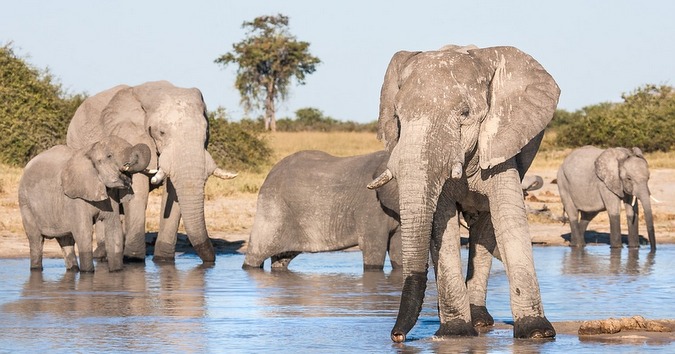
The following letter (see below) has been sent to Dr Mokgweetsi Eric Keabetswe Masisi, President of Botswana, with regard to elephant management in Botswana.
The letter offers evidence of options for managing elephants and reducing conflict between them and the people who share their range, and that conflict is not unavoidable and unresolvable.
“Botswana has a unique opportunity to extend existing efforts for coexistence with elephants,” state the authors, “while simultaneously promoting ecosystem conservation and sustainable rural livelihoods…for the benefit of all.”
The letter is signed by a number of scientists and campaigners.
Read the letter below:
Your Excellency, President Dr. Masisi
We are writing in response to ongoing debate over elephant management in Botswana. In particular, we wish to discuss the diverging opinions over options for managing elephants and reducing conflict between them and the people who share their range. We are in full agreement with your Government that equitable solutions must be found so that rural livelihoods are maintained and improved while elephant populations and their ecosystems are conserved.
However, we are concerned that much of the rhetoric is giving the impression that conflict is both unavoidable and unresolvable. Viewing conflict as the only inevitable outcome when elephants and people share land encourages a confrontational approach that is likely to exacerbate problems for both. We recognise how difficult it must be to cope with political pressure surrounding human-elephant conflict. At the same time, we believe that science offers important insights that can help managers improve human livelihoods through the coexistence with elephants.
In several instances, we have seen the media portray Botswana as having “too many elephants”. The current population of some 130,000 elephants is said to be growing, or even “exploding”, although evidence from surveys shows that numbers have not increased significantly since at least 2006 and it is likely that densities (numbers per unit area) have remained fairly steady since the late 1990s, at a level dictated by their food and water supplies. A hypothetical figure of 54,000 (equivalent to 0.33/km2) has been pronounced as the correct number for Botswana’s ecological “carrying capacity”, with elephants said to be out of balance with plant communities. Such speculative statements confuse and inflame the public, damaging elephant, ecosystem and human interests.
Botswana’s long experience of drought or flood years, and the great changes in the water levels in the Okavango Delta, Lake Ngami and the Boteti River, makes clear the degree to which semi-arid savanna ecosystems vary over time, defying the concept of a stable balance. Ecological changes occur both on a broad geographic scale covering whole landscapes, and over time scales that span decades.
Elephants were almost exterminated across much of Africa by hunters in the obsession for ivory that occurred in the 18th and 19th centuries, and rinderpest killed many species of antelopes in the late 1800s. With few animals to disturb the adult trees or their seedlings, woodlands spread across wide areas. When the elephants and impalas returned again later in the 20th century, the woodlands near water sources were cut back and restored to their previous condition.
Moving forward, we believe that allowing elephants to naturally and safely disperse within northern Botswana and across the KAZA Transfrontier Conservation Area provides the best management solution to the current situation. Wildlife corridors that facilitate elephant movements, through areas that are being settled by people, already exist. Elephants know where these corridors are and will readily use them as long as they remain open and protected. Encouraging elephant movements would reduce pressure on any one area rather than concentrating their activities, and would protect human interests from elephant impacts. It also allows ecosystems to benefit from the ecological and economic good that elephants provide.
Effective maintenance of corridors is already underway in Ngamiland, through zoning by the Tawana Land Board, combined deterrence (with chillies, beehives and electric fences) to protect crops, and improvements in rural livelihoods in partnerships with farmers.
Botswana has a unique opportunity to extend existing efforts for coexistence with elephants, while simultaneously promoting ecosystem conservation and sustainable rural livelihoods across KAZA for the benefit of all. We hope your country will seize this opportunity to build on the evidence-based approach and demonstrate the benefits of sharing landscapes between people and wildlife across Africa.
Sincerely,
(in alphabetical order)
Victoria Boult, Research Scientist, University of Reading
Vicki Fishlock, Resident Scientist, Amboseli Trust for Elephants
Phyllis Lee, Emeritus Professor, University of Stirling
WK Lindsay, Collaborating Researcher, Amboseli Trust for Elephants (corresponding author)
Cynthia Moss, Director, Amboseli Trust for Elephants
Joyce Poole, Director, Elephant Voices
Ian Redmond, Elephant biologist and Ambassador to the Convention on Migratory Species (CMS)
Rudi van Aarde, Emeritus Professor of Zoology and Chair: Conservation Ecology Research Unit, University of Pretoria
To comment on this story: Login (or sign up) to our app here - it's a troll-free safe place 🙂.![]()






